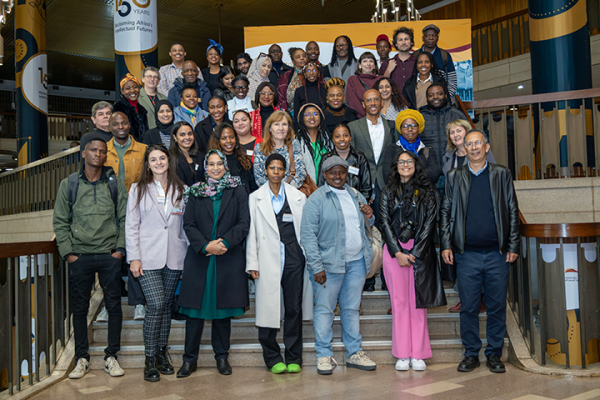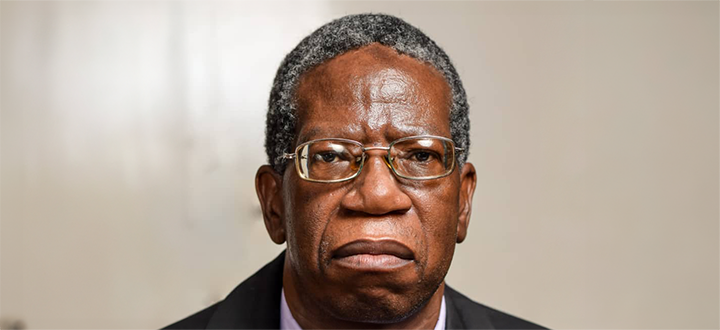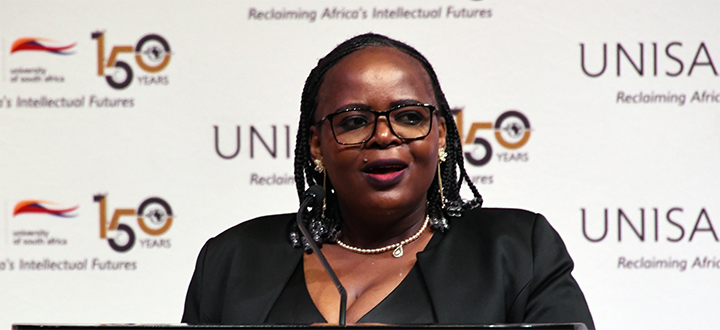News & Media
Black Planetary Studies takes centre stage at Unisa
On June 27, 2024, Unisa celebrated a landmark event with the launch of the Centre of Excellence for Black Planetary Studies. This groundbreaking initiative, led by esteemed scholars, aims to integrate black and indigenous knowledge systems into marine and coastal research. The centre, housed within the Institute for Social and Health Sciences in the College of Human Sciences, embodies Unisa’s strategic commitment to environmental sustainability and transdisciplinary innovation. At the launch, key figures emphasised the centre's role in advancing collective futures through focused knowledge generation and community engagement.

Attendees at the launch of the Centre of Excellence for Black Planetary Studies
Professor Thenjiwe Meyiwa, Vice-Principal: Research, Postgraduate Studies, Innovation and Commercialisation, emphasised that this establishment marks a pivotal moment in integrating disciplines beyond the natural sciences into Unisa’s marine and coastal studies, a key research area in the university's strategic direction towards knowledge generation. Meyiwa highlighted that the centre symbolises the university’s commitment, both financially and intellectually, to positioning itself as a leader in marine studies, particularly given South Africa's extensive coastline. She underscored the responsibility to preserve scarce water reserves and oceanic resources.
The centre is a transdisciplinary research and community engagement initiative. At the launch, Professor Zethu Nkosi, Executive Dean of the College of Human Sciences, praised the initiative as a testament to innovative research and collaboration with water and coastal communities. She remarked that the centre exemplifies the potential for collective progress through targeted knowledge generation.
Professor Hugo ka Canham, the centre’s director, explained that the field of Black Planetary Studies harnesses black and indigenous knowledge to ensure the sustainability of the planet and our shared future. These knowledge systems de-emphasise human centrality, focusing instead on interspecies relationships, the significance of place, and the interplay between humans, oceans, and other water bodies. Canham emphasised the integration of spiritual and ancestral cosmologies, plant and animal ecologies, and black solidarities across geographies.
The field of Black Planetary Studies offers an interdisciplinary framework encompassing humanities, natural sciences, environmental and climate studies, religious and geological studies, black, indigenous feminist, and queer studies, as well as art. Canham argued that elements such as air, sand, and water are vital not only for physiological survival but also for fortification, ritual, healing, and ancestral communion. He asserted that Black Planetary Studies engages with health, spirituality, water as a living element, as a historical lens, as both discursive and material, aesthetic, and as a matter of social and climate justice, conflict, peace, livelihoods, and solidarity formation.
The launch featured presentations from leading scholars from various universities. Professor Justin Dunnavant, an archaeologist and anthropologist from the University of California, Los Angeles, highlighted the importance of underwater research for uncovering suppressed histories of slavery and human-water entanglements. Dr Mmatshilo Motsei from Africa Ikalafe discussed the spiritual dimensions of water healing, moving the audience with her insights into water's healing properties. Professor André Keet, Deputy Vice-Chancellor and Chair of Critical Higher Education Studies at Nelson Mandela University, stressed the importance of critically examining international bodies that obscure the roots of inequality through their development goals. Professor Lesley Green, director of Environmental Humanities South at the University of Cape Town, urged researchers to maintain independence from government entities that may distort public information. She provided examples of officials misrepresenting E. coli levels caused by sewage discharge into rivers and oceans and highlighted the value of citizen science and activism, citing the Amadiba Crisis Committee on the Wild Coast.
The Centre of Excellence for Black Planetary Studies is set to address urgent environmental challenges by centring black and indigenous knowledge in both scholarship and practice. Echoing Motsei’s sentiments, Professor Shahnaaz Suffla, the programme director, encouraged attendees to recognise ‘our water story’. “By internalising this narrative,” she said, “we can collectively work towards preserving our shared environment.”
* By Professor Hugo Ka Canham, Director: Centre of Excellence for Black Planetary Studies, Institute for Social and Health Sciences, and IHlubi Veli Mabona, Marketing Assistant, College of Human Sciences
Publish date: 2024-07-03 00:00:00.0


 Mental health among men in the workplace needs more attention
Mental health among men in the workplace needs more attention
 "I owe everything to Unisa and my late supervisor's priceless mentoring"
"I owe everything to Unisa and my late supervisor's priceless mentoring"
 Majikijela - a queer scholar raising homosexuality awareness through his work
Majikijela - a queer scholar raising homosexuality awareness through his work
 Unisa and Inqaba Biotec unveil groundbreaking DNA research platform
Unisa and Inqaba Biotec unveil groundbreaking DNA research platform
 College of Law appoints esteemed scholar as executive dean
College of Law appoints esteemed scholar as executive dean